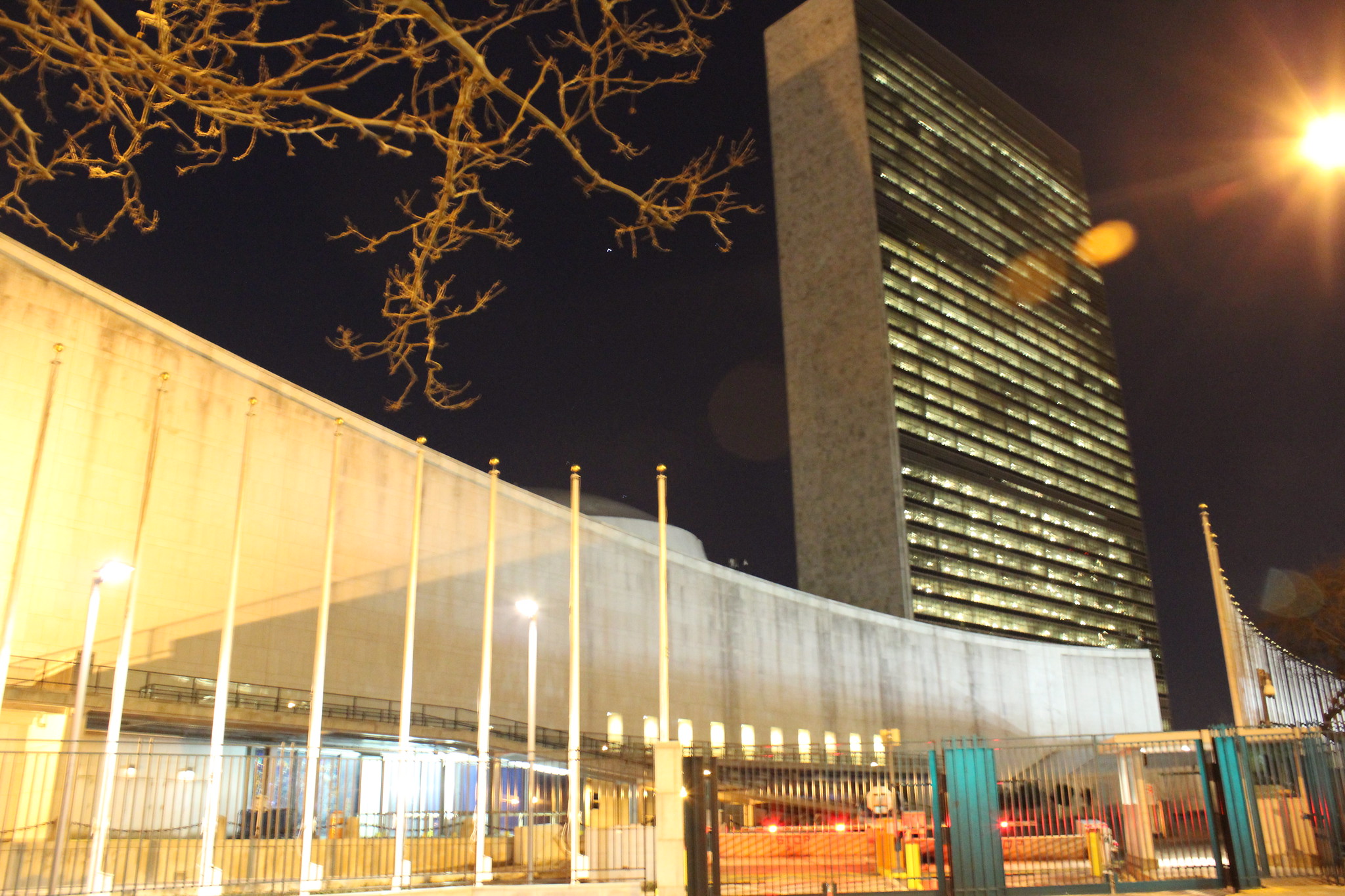Putin Can’t Destroy the International Order by Himself
It’s too early to write the obituary of the postwar international system.

Published by The Lawfare Institute
in Cooperation With

Editor's Note: This post also appears on Just Security.
The world is witnessing the largest land war in Europe since the Second World War. This brazen act of aggression by the Russian Federation has prompted some officials and commentators to declare that the dams are breaking and the modern international legal order is collapsing. Earlier this week, for example, Ukraine Foreign Minister Dmytro Kuleba predicted, “The beginning of a large-scale war in Ukraine will be the end of the world order as we know it.” Meanwhile, Susan Glasser of the New Yorker tweeted, “Sadly, there is no international order.”
But while the invasion ordered by Russian President Vladimir Putin is in direct violation of the most fundamental principle of the international legal order—the prohibition on the use of force—it’s too early to write the obituary of the postwar international system. These commentators are making a mistake not just about international law. They are making a mistake about law in general. If they understood how law really works, they would see that Putin’s invasion is not enough, on its own, to destroy the world order. Indeed, depending on how states respond, the invasion has the potential to reaffirm the very legal rules he has violated.
The main function of the law, as the philosopher H.L.A. Hart has argued, is to guide conduct. The law tells us what we may or may not do. But legal institutions don’t naively assume that we will obey its demands. It has contingency plans. Domestic law sets out detailed procedures for responding to its failure to guide conduct successfully. That’s why we have police, courts, lawyers, wardens and parole officers. Public law even provides for the punishment and impeachment of public officials who break the law. As James Madison famously observed: “If Men were angels, no government would be necessary.”
While domestic law does a good job at policing legal violations, it is not foolproof—especially in the area of public law. The House of Representatives impeached President Trump twice for high crimes and misdemeanors. Trump was not removed from office because the Republicans in the Senate refused to convict their party leader despite the strong evidence of wrongdoing. But we don’t declare American domestic law a failure as a consequence.
Like domestic law, international law makes demands of sovereign states. And like domestic law, international law has a Plan B for when Plan A fails. As we detailed in our book, The Internationalists, for hundreds of years, Plan B was war. War was the legally permissible way that states had for righting legal wrongs done to them. The legal right of conquest was designed to compensate the victorious victim. But thanks to the Kellogg-Briand Pact of 1928 and the U.N. Charter of 1945, war is no longer a legitimate way for states to enforce international law—though states subject to aggression, like Ukraine today, are allowed to defend themselves under Article 51 of the charter. International law now provides for other ways for states to respond to violations—including through the use of economic sanctions. And just as with domestic legal systems, these mechanisms do not always prevent abuses, and they do not always adequately punish abuses.
All this means that commentators should look not just at Putin’s decision to break the law but also at the response of other states to it. And here we have reason to think the law is much more robust than declarations of its demise would suggest. States have responded to Putin’s invasion of Ukraine and his decision earlier this week to formally recognize the independence of two breakaway regions of Ukraine not merely with condemnation but with widespread and robust action. On Monday, after Moscow recognized the two separatist regions of Ukraine and authorized the deployment of Russian troops to them, the U.N. Security Council held an emergency meeting at which the United States and allied nations condemned the actions as a clear violation of international law.
Russia’s flimsy—and clearly meritless—legal justifications were rightly dismissed at the emergency meeting. States have affirmed that, in the absence of Security Council authorization, a change in borders of a state or recognition of independence of part of an existing sovereign state requires that state’s freely given consent—something clearly not present here. Likewise the Kremlin’s claim that rebel leaders have asked for Russian military help to fend off Ukranian “aggression” has been rightfully treated as meritless. Even if true, such a request would not give Russian forces legal authority to invade another state and try to topple its government.
Referencing the principles in Article 2(4) of the U.N. Charter, U.S. Ambassador Linda Thomas-Greenfield declared that “Russia’s clear attack on Ukraine’s sovereignty and territorial integrity is unprovoked.” She continued, “It is an attack on Ukraine’s status as a UN Member State, it violates a basic principle of international law, and it defies our Charter.”
Other countries joined the condemnation. The Estonian Parliament, for example, condemned “the violation of the fundamental principles of the United Nations by the Russian Federation.” It continued, “Using threat of force the Russian Federation is brutally violating the sovereignty of Ukraine, and by using force, undermining its territorial sovereignty.” Turkey issued a statement that the attack “is a grave violation of international law and poses a serious threat to the security of our region and the world.” A flood of states from around the world have echoed these condemnations.
And, perhaps more importantly, states are matching words with action. In response to Russia’s illegal recognition and occupation of the breakaway regions of Ukraine, the United States and Europe released a first tranche of sanctions. Now, in response to the more wide-scale attack, Biden announced new sanctions that will “impose severe cost on the Russian economy, both immediately and over time.” The European Union and Canada have announced similar plans. European Union leaders are reportedly considering removing Russia from SWIFT, an act that would make it nearly impossible for financial institutions to send money in or out of Russia. Even before this latest set of announcements, Russia’s stock market and currency had cratered in the face of the promised measures, forcing Russia’s central bank to tap its $600 billion-plus reserve chest to staunch the slide.
Some analysts have asked, if sanctions didn’t stop Putin from invading Ukraine, then what difference do they make at this point? The same question, of course, can be asked of any punishment. “Why punish the murderer? The victim is already dead!” The answer is obvious: We punish to condemn behavior and deter similar behavior in the future. The case for sanctions here is even stronger. As long as Russia occupies the country or it is governed by a puppet regime installed by Putin, that violation continues. The continued response to the continued violation makes clear that the legal principles involved are ones that the world stands behind. A forceful response, therefore, would have the effect of reaffirming the legal prohibition.
It is worth noting, moreover, that the widespread condemnation has been so unified and swift in part because such blatant violations of the prohibition against aggressive war have been extraordinarily rare. Since World War II, the number of interstate wars prohibited by the charter has diminished drastically. That, too, is a sign of the system’s strength. The legal rules prohibiting states from resorting to force against one another are so strong and generally so effective that they are often taken for granted.
Events like this should remind us that the current international legal system grounded in peace, not war, is a relatively recent invention, and it takes work to keep it healthy. It should cause us, too, to reflect on actions the United States and its allies have taken in recent decades that have weakened the very legal system they are now championing—the second Iraq War and the ever-growing expansion of the self-defense exception chief among them.
The real test will be what happens in the longer term. Putin is likely planning to put in place a puppet government that will “consent” to his many illegal actions. He is almost certainly counting on the coalition that has responded to the current crisis to fray over time as costs mount. That is a real and serious danger. Plans should be made now to hold the alliance together as long as necessary—for years, and perhaps decades. That means planning now for alternative energy sources for Europe, shoring up protections for countries in the region that may be vulnerable, and forming a mechanism for considering additional steps as needed.
The Russian invasion of Ukraine is a blow to the international legal order—and it’s likely to lead to terrible destruction and loss of life. But it will succeed in undermining the system that has enabled unprecedented decline in interstate wars only if the rest of the world lets it. A healthy legal system responds aggressively and resolutely to assaults on it. If the response is broad, robust, and sustained, then the modern legal order will not weaken. It will strengthen.






